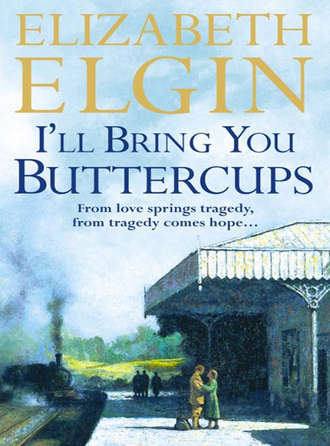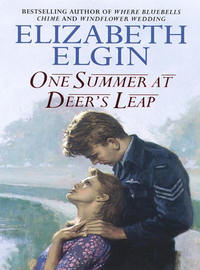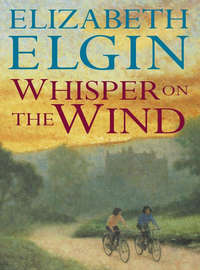
Полная версия
I’ll Bring You Buttercups
‘Now the Suttons here at Rowangarth – the Garth Suttons – have breeding. Goes back hundreds of years. Pedigree. That’s what counts.’ Reuben knew all about pedigree, from gun dogs upwards. ‘So be sure to give Pendenys as wide a berth as you can, lad, for even their head keeper is crooked as they come and feathering his nest.’
‘But she’s all right now?’ Tom didn’t care about the Pendenys Suttons. All he wanted was to talk about Alice Hawthorn who had scarcely been out of his thoughts since the afternoon he met her. ‘Alice seems happy enough at Rowangarth.’
‘Oh my word, yes. A different young lady, these days. And done well for herself. Her mother was a dressmaker, so I’m told, and Alice seems to have inherited her skills. She’s sewing-maid, now, and answers to nobody but Miss Clitherow – and Lady Helen, of course. And her’s going to London, maiding Miss Julia.’ To London, and her not eighteen till June. All that way away when most folk never strayed beyond the Riding, let alone set foot outside of Yorkshire. ‘Ah, well,’ he consulted his pocket-watch, checking it with the ponderously ticking mantel-clock, ‘if you’ve finished your sup of tea we’d best get on with the rounds. You take the woodland and I’ll see to the rearing field.’
‘Right, Mr Pickering.’ Tom jumped instantly to his feet, giving the older man his full title, which was only polite once in a while. ‘There’s still a few nests not hatched out yet.’
Nests? Reuben chuckled, eyeing the fast disappearing back, when Alice and that Morgan dog should be walking the woodland? Always did, wet or dry, before servants’ tea. And to be hoped when the lad met her he talked about summat more interesting than dogs and the weather, or he’d lose her, sure as eggs was eggs, he would. And Reuben didn’t want that to happen, for he’d found a lot of good in young Dwerryhouse and he was more than fond of the lass who took the edge off his loneliness and was ever willing to sew on a patch, or a button or two, for an old widower. To have her settled with Tom would please him greatly.
‘Sure as eggs is eggs,’ he muttered, pulling on his hat.
Helen, Lady Sutton, sighed deeply and gazed at the lavender dinner dress draped carefully over the bed; at the matching satin shoes, the white silk stockings and the garters laid beside them. She did not want to wear those clothes, for when she had bathed and had her hair pinned and finished the time-consuming ritual of dressing, she would be going to dinner at Pendenys Place and she did not like Pendenys, nor anything about it, nor care overmuch for anyone who lived there – except Edward, that was.
‘Why the frown, Mother?’ Julia Sutton slammed shut the door behind her. ‘I told you not to wear the lavender, didn’t I? You’re out of mourning now and lavender and mauve and purple are mourning colours and you shouldn’t –’
‘Julia! When will you learn to knock on a bedroom door and please, don’t ever tell your mother anything! And what do you expect me to wear, newly out of black? Red, should it be, like a music hall soubrette?’
‘Blue would have been lovely. Pa always liked you in blue.’
‘Your papa is no longer here,’ she whispered, her voice sharp-edged with remembered grief.
‘No, darling. Sorry.’ Julia brushed the pale cheek with gentle lips. ‘And the lavender is perfectly acceptable, come to think of it, for a visit to Pendenys. Shall you wear your pearls?’
‘I think not.’ She didn’t want to wear the pearl choker tonight; not her husband’s wedding gift. ‘Just the ear-drops, and flowers. They’re in the pantry now, keeping fresh.’
Flowers. She would be wearing Pa’s flowers, Julia frowned; she should have known it. Her mother had carried orchids as a bride, and thereafter Pa had ordered the cream-coloured beauties to be grown in the orchid house at Rowangarth. No one was to pick them without milady’s permission, and no one was ever to wear them but her ladyship. A dashing declaration of love it had been, for though their marriage was arranged, they had loved deeply, too. And she, Julia Sutton, would marry for love or not at all. One day she would find the right man, and at the first meeting of their eyes he would know it and she would know it and …
‘Darling Mama.’ She hurried to where her mother sat, dropping to the floor at her feet, resting a cheek on her lap. ‘I know how awful it will be for you without Pa, this coming out into the world again. But Giles will be with you tonight. And I think she meant to be kind, asking you over there when she knew the time was right.’
‘She, Julia?’ The voice held a hint of reproof.
‘Aunt Clementina, I mean, only I do so dislike calling her Aunt. It means she’s really family …’
‘Which she is,’ Helen Sutton sighed.
‘Well, Uncle Edward married her, I suppose, though the poor old love had to, him being –’
‘No one has to do anything. How many times have I told you that?’
‘Then when you say I must marry, can I remind you of what you just said?’
‘I merely meant that Edward married her of his own free will.’
‘And for her money …’
‘Married Clementina Elliot of his own free will, Julia, and what else was he to do? What else is a second son whose expectations are nil to do?’
‘Hm. I suppose Giles will have to do the same, poor pet – marry for money, I mean.’
‘Your brother, I hope, will eventually love where money lies. It would be to his advantage were his wife to have some means of her own.’
‘I don’t think Giles will ever marry,’ Julia shrugged. ‘It’s a pity he can’t go to Cambridge. He’d be happy, there. Why must he stay here, just because Robert is too selfish to –’
‘Julia! You mustn’t speak of your brother in that way.’ Helen Sutton rose swiftly to her feet and strode to the window. Mention of her eldest son always agitated her – and the secrecy he wrapped around himself; his selfishness in returning to India.
‘Why mustn’t I?’ She was at her mother’s side in an instant. ‘You know he should have stayed here after Pa died. Why should Giles have all the bother of Rowangarth when it won’t ever be his? Why can’t Robert come home and marry and do what’s expected of him? Why? Will you tell me?’
‘Because your brother is his own master. Because he’s a grown man and –’
‘Then why doesn’t he act like one? He’s needed here, now, but he’s oceans away, growing tea.’
‘Tea keeps Rowangarth going – and besides, Robert loves India.’ They were on dangerous ground and her daughter, Helen Sutton was forced to acknowledge, was altogether too blunt for her own good. ‘And I don’t wish to talk about Robert.’
‘No. Nor his love for India – though I’ll bet anything you like that isn’t what her name is!’
‘Julia! I will not –’ Her voice trailed away into despair and she covered her face with her hands as if to block out the conversation.
‘Mama! I’m sorry. You know I didn’t mean to hurt you. And I know it’s just three years since Pa went and I shouldn’t be talking like this because you’re the dearest mother anyone could wish for. You know I didn’t mean what I said.’
‘I know you didn’t. But could we talk about tonight instead? Could I tell you how much I’d rather stay home – how much I’d rather do anything than accept Clemmy Sutton’s hospitality.’ Her lavish, ostentatious hospitality; her patronizing of the Garth Suttons, who were poor compared to the Suttons of Pendenys. Why did they irritate her so when it was obvious to anyone that jealousy was at the root of Clementina’s discontent; because not all the money in the Riding could buy the one thing she – and yes, her father, too – coveted above all else and would never, could never possess.
She had come to Edward Sutton, that only child of an Ironmaster, with nothing to commend her but her father’s riches, knowing she was tolerated but not accepted by the county society into which she had married. Her father was in trade – it was as simple as that, and Clementina was considered to be as vulgar as the house her father’s money had built. An obscenity in stone and slate was Pendenys Place; a flat-roofed, castellated building that had set out to be a gentleman’s house and ended up believing itself a castle, so much pride and defiance had gone into it. For old Nathan Elliot’s imagination had run wild when he built his daughter’s house, and the architect, being young and ambitious and extremely poor, had not gainsaid his patron.
Pendenys boasted a butler, a housekeeper, two footmen and many servants, most of them young and poorly paid. It stood out like a great grey scab on the beautiful countryside, the only thing to commend it being that it could not be seen from the windows of Rowangarth.
Pendenys Place stood brash on a hilltop, a defiant monument to the pride of a self-made man, lashed by wind and rain and still not one iota mellowed by them.
Helen Sutton signed, becoming aware that her daughter’s eyes regarded her with an openness she had come to expect, a frankness that was a part of her.
‘Is something wrong?’ She drew her fingers across her cheek. ‘A smut?’
‘No, dearest. Whilst you were miles away, thinking, I was thinking how beautiful you are and wondering why I’m not in the least bit like you.’ Why she had not inherited the fineness of her mother’s bones, her clear blue eyes, her thick, corn-yellow hair.
‘Not like me? And you aren’t like your father, either. I think you favour your aunt Sutton, child. You have her independence and her courage. But don’t grow into an old maid like she is, because you have your own special beauty, though you won’t admit it.
‘Why do you freeze men out, Julia? Because you do, you know. Sometimes I think you go out of your way to do it.’
‘I know I do. But it’s only because the right man hasn’t come along yet, and you did say, you and Pa, that you’d never interfere and let me marry where I wished. And I shall know him, when we meet. I’ll know him at once, so don’t worry about me. Let’s talk about tonight, shall we, and Aunt Clemmy and her awful Elliot?’
‘Must we?’ Helen Sutton shuddered. She intensely disliked her brother-in-law’s elder son; wondered why a stop hadn’t been put to his extravagant ways, his drinking and his women. And especially to his whoring.
Blushing, she checked herself at once. She had allowed herself to think a word no lady should even know. But whoring – and there was no other word for it – and Elliot Sutton were synonymous, and she would rather her daughter entered a convent than marry a man with so dreadful a reputation. ‘Must we talk about Clementina and her everlasting complaining about the cost of servants and the amount they eat?’
‘Perhaps not.’
‘Nor about her son who is no better than – than he ought to be.’
‘Elliot … I suppose you can’t entirely blame him for being as he is.’ Julia Sutton was nothing if not fair. ‘After all, his father spends his time buying books and reading books. I think Uncle Edward loves learning better than he loves his son, and you can’t, as Mrs Shaw is always saying, make a silk purse out of a sow’s ear. Elliot can’t ever be a gentleman with a mother like Aunt Clemmy. She’s common!’
‘That is unfair! And Mrs Shaw shouldn’t say things like that,’ Helen gasped, though her eyes were bright with mischief and her lips struggled against a smile. And hadn’t her John always said that a man could choose his friends, but his relations he was stuck with and must make the best of.
So tonight she would try her best to be kind to Clemmy and her eldest son. She would wear her almost-out-of-mourning gown because it would be expected of her, and she would take the arm of her younger son for support and wear John’s orchids with love.
Tomorrow it would be all over, and she could pick up the threads of her shattered life and face the world alone. And tomorrow, too, she would wave a smiling goodbye to Julia and Hawthorn and do nothing that would cast the least sadness on their great adventure.
‘Let’s talk about London,’ she smiled.
‘So what’s this, Alice Hawthorn? You dog-walking again tonight, an’ all?’ The young keeper’s face so reflected his pleasure that he even forgot to reprimand her for bringing a dog to the rearing field, where coops and runs for game chicks stood in orderly rows. ‘Thought Mr Giles usually gave him his late-night run?’ He bent to pat Morgan’s head and fondle his ears and the spaniel whimpered with delight and wagged his tail so furiously that his rump wagged with it. ‘Gone out, has he?’
‘Gone out with her ladyship, and Miss Julia’s away into Holdenby for supper at the vicarage, so Cook said staff could eat cold tonight and I wasn’t needed to help out.’ She finished, aware she was blushing furiously on account of her being here, because Reuben had told her when she passed his gate that Tom was in the rearing field shutting up the coops for the night, and that if she hurried she might just catch him there.
‘Don’t know what you mean,’ she’d said, all airy-fairy as she strolled past, but she had run like the wind the moment she was out of sight of the cottage, desperate to see him. They were leaving for London early tomorrow morning, and if she didn’t see him tonight, she had thought despairingly, she didn’t know how she would live out fourteen days away from him.
‘There now. That’s the last of them done.’ He placed a board against the slats of the coop, leaning a brick against it. ‘I’ll walk you back, if you’d like.’
‘You don’t have to, Tom …’
‘No trouble. It’s on my way to the bothy.’ He smiled again. ‘Come on now, Morgan. Keep to heel,’ he said in the stern voice he kept for the dog, nodding his satisfaction as the spaniel did exactly as it was told. ‘So Lady Helen is visiting? Gone to Pendenys, so the coachman told me’
‘Mm. Sad for her, isn’t it, without Sir John? And she looked so beautiful tonight. We all stood in the hall to see her go – and so she’d know we wished her well, poor lady.
‘There was Cook and Tilda from the kitchen, and Bess. And Mary who waits at table, and me. And Miss Clitherow gave her a hand downstairs. That frock has a bit of a train on it, so she had to walk very straight, and careful.’ And proud, Alice thought, with her lovely head held high. ‘She smiled when she saw us, Tom, and we all gave her a curtsey, though she don’t ever expect it.’ Not like one she could mention who – though she wasn’t a lady and never would be, Cook said – had her servants bobbing up and down like corks in a bucket.
‘Not a lot of staff at Rowangarth,’ Tom offered his hand at the woodland stile. ‘Not for a gentleman’s house, I mean.’
‘Happen not, but we manage. After all, Sir Robert’s in India, Miss Julia’s no trouble at all and Mr Giles is as often as not shut up in the library. And with her ladyship being so long in mourning and her not going out or receiving callers or giving parties – well, we haven’t been overworked, exactly.’
‘Do you remember what it was like at Rowangarth, Alice, before Sir John was killed? I reckon there’d be some fine old shoots, here on the estate?’
Alice didn’t know about the shooting, she said, but she remembered one or two parties.
‘They’d just had their silver wedding when the master was taken. My, there was half the Riding at that do. But I’d only been here a couple of months, then the house went into mourning when Sir John was killed.’
‘A motor accident, wasn’t it?’
‘Aye, and all the fault of King Edward and his speeding.’ All because the King had driven at sixty miles an hour, would you believe, along the Brighton road. After that, every motor owner had donned cap and gloves and goggles and tried his damnedest to do the same. But the Prince of Wales – they’d hardly got used to calling him King when he died – had waited so long to get his throne, Cook said, that he lived life fast and furious as if he’d known he’d get less than ten years out of his crowning. ‘Sir John tried to drive faster than the King, you see, and skidded at a bend, and –’
‘And that’s why her ladyship won’t have a motor,’ Tom finished, matter-of-factly.
‘That’s why. And Mr Giles and Miss Julia both able to drive and desperate for motors of their own and not daring to buy one. Miss Sutton in London has a motor – it’s at Aunt Sutton’s house we’ll be staying when we’re in London. Oh, who’d have thought it? Someone like me maiding Miss Julia!’
‘And what do you mean by that?’
‘Well, someone – ordinary.’
‘But you aren’t ordinary, Alice Hawthorn.’ He stopped, resting his hands on her shoulders, turning her to face him. ‘You’re extraordinary pretty, to my way of thinking.’
‘Pretty?’ Her eyes met his and she felt trapped and excited and peculiar, all at the same time. ‘Oh, but I’m not! If you’d wanted to see what pretty is, you should have seen her ladyship tonight. So lovely she was, and all shining in satin. And no jewels at all, ’cept for her earrings. And her orchids, Tom; her own special orchids, all creamy-white, same as she carried to her wedding to Sir John.
‘They were special between them, those orchids. Oh, mustn’t it have been wonderful, them loving like that – and romantic, to be given orchids. But listen to me going all soft. No one will ever give me orchids,’ she sighed.
‘Happen not, pretty girl, but it isn’t all women are suited to orchids, and you are one of them. You, lass, are more in keeping with –’ he bent to pluck some of the flowers that grew wild in the grass at their feet, smiling as he tilted her chin – ‘to these. You’re a buttercup girl, Alice. All fresh and shining you are, so hold yourself still so I can see if you like butter.’ He held one of the flowers to her throat and smiled at the golden glow that shone from the whiteness of her skin. ‘Oh, aye, you’re a buttercup girl, and no mistake.’
‘I am?’ She closed her eyes because his mouth was only a kiss away and she had wanted so long for him to kiss her.
‘That you are. Let them keep their fine flowers, Alice. I’ll give you buttercups, my lovely lass, and they’ll be more special between us than the rarest orchid that ever grew.’
He touched her lips gently with his own and fire and ice ran through and left her shaking and afraid to open her eyes lest he should see what shone there. And when he gathered her to him it was like a homecoming, and she lifted her arms and wrapped them gently around his neck because it was the only way she knew to tell him that she would like to be kissed again.
‘You’re my girl, aren’t you, Alice?’
He had never expected it would be like this; never thought he would feel tenderness for her along with his wanting, nor once imagined he would feel like throttling with his own hands any man who threatened to harm her innocence.
‘I’m your girl, Tom …’
‘So we’re walking out steady, now, and you’ll sit by me in church?’
‘When I’m back from London.’
‘Then look at me, and tell me so.’
‘Tom?’ All at once it was easy and she looked smiling into his eyes and whispered, ‘I’m your girl, Tom Dwerryhouse, and I love you. There now, does that suit you?’
‘It does, sweetheart. It suits me very nicely.’ His eyes loved her as he handed her the buttercups. ‘Very nicely indeed.’
She closed her eyes again and sighed tremulously. In her lonely youth she had longed for this; yearned to be close to someone, and special. Not so long ago she had been so happy about London she had told the rooks she was fit to burst of it, but this was different. This was even better than happiness. Tonight, Tom had kissed her, and she was loved.
2
London seethed and shimmered and sang with magic: nothing but houses in streets and terraces and squares; trees in May leaf and parks pink and white with blossom; elegant ladies and elegant shops; costermongers yelling their fruit for sale; motors honking, and cab drivers shaking their whips at motors for frightening their horses and oh, just everything.
‘I said you’d like London, didn’t I, Hawthorn?’
‘Oh, yes.’ She did, now that she had become as off-hand about it as Miss Julia; used to the size and the speed and the sound of it and learned to keep out of the way of motor drivers and cab drivers, all determined to run her over. Already they had window-gazed and walked in Hyde Park and St James’s Park and visited Westminster Abbey and stood, shaking with excitement, at the gates of Buckingham Palace – though not so much as a glimpse of the King and Queen had there been. And now they sat, feet aching from the London pavements, in the kitchen of Aunt Sutton’s tiny, tucked-away house, eating sandwiches and drinking tea and discussing where to go tonight.
‘We mustn’t waste money on theatres and things, Hawthorn. A lot of London is free, if you know where to go. Soon we shall take a trip on the Underground, but tonight we must try to find a meeting.’
‘A meeting, miss?’ Alice frowned, all the while thinking fearfully of trains that hurtled through dark tubes dug deep beneath London.
‘You know what kind of meeting.’
She knew, but like riding on a tube train, Alice was determined not to think too much about it, though it wasn’t any use ignoring the fact that Miss Julia was looking for a political meeting – a Votes-for-Women meeting – and if Lady Helen ever got to hear about it there’d be no end of a to-do.
‘Take care of my daughter, Hawthorn. Don’t let her lead you a dance,’ she’d said as they left Rowangarth, but when Alice thought about it, there wasn’t a lot a sewing-maid could do if her young mistress was set on going to one of those meetings; nothing, save go along with her because that, really, was why she was in London. But downright ridiculous it was, and a waste of time, because what would a woman do with a vote, even supposing she got one? At least that was what Cook wanted to know when they talked, one teatime, about the suffragettes who’d been sent to prison for causing an affray and had straight away refused all food. And the prison warders were compelled to force-feed them – for their own good – which couldn’t have been very pleasant, Alice remembered thinking.
‘Force-feed,’ Tilda scathingly remarked. ‘Isn’t nobody can make you eat if you don’t let your throat swallow.’
‘Happen not. But they force a tube down your throat,’ Cook had retorted, red-cheeked, ‘then they pour slops down it, so you’d be forced to eat. Force-feed, see? That’s what they mean by it.’
‘Meeting, miss?’ Alice closed her mind to the horror. ‘One of Mrs Pankhurst’s meetings? I don’t think her ladyship would like that, nor Miss Sutton.’
‘But my mother isn’t here, nor Aunt Sutton.’
No. Nor Miss Sutton’s maid, either. Indeed, they were alone in this house – apart from the cleaning woman who came mornings. It was unheard of, Alice brooded. Lady Helen would never have allowed the London trip had she known her sister-in-law’s live-in maid would be away in Bristol for a family wedding, and staying on there for a holiday.
‘I don’t know why Miss Sutton didn’t think to mention it to her ladyship – about us being here on our own, I mean.’
‘Nor do I,’ Julia grinned, ‘but I’m glad she thought she’d mentioned it.’ Always forgetful, her father’s elder sister – when it suited her, that was. ‘And you aren’t going to mention it when we get back home, are you, Hawthorn?’
Alice said she wasn’t, though she didn’t like being a party to deceiving Lady Helen. Suffragette meetings were illegal now; had been since last year when there’d been terrible trouble over breaking windows and knocking off policemen’s helmets and the forced feeding in prison. But Miss Julia was set on going, though if they ran away quickly when the police arrived, then surely no one need be any the wiser.
‘If we were to find one of those meetings, miss, you wouldn’t do anything awful, would you?’
‘Of course I wouldn’t. I just want to be there, that’s all. Oh, isn’t it nice doing exactly as we please and no one at all to boss us about?’
Alice had to agree that it was. It was better than nice, in fact, because Miss Julia was no end of a good sport who, since they’d been in London, had treated her almost like an equal. And wasn’t she being stupid, Alice asked of her conscience, to start making a to-do about a meeting that might never come about when she was having such a fine time?







